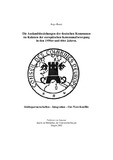Citation link:
https://nbn-resolving.org/urn:nbn:de:hbz:467-119| DC Field | Value | Language |
|---|---|---|
| dc.contributor.author | Bautz, Ingo | - |
| dc.date.accessioned | 2019-09-02T09:52:59Z | - |
| dc.date.available | 2005-09-14T12:12:12Z | - |
| dc.date.available | 2019-09-02T09:52:59Z | - |
| dc.date.issued | 2002 | - |
| dc.description.abstract | Nach dem Ende des Zweiten Weltkriegs drängten die Kommunen als transnationale Akteure erstmals auf die Bühne der internationalen Beziehungen. Im Selbstverständnis vieler Kommunalpolitiker war es das Ziel, die Macht der Nationalstaaten durch europäische Integration von oben und Ausbau der kommunalen Selbstverwaltung von unten einzuschränken. Im Gegensatz dazu waren die europäischen Regierungen vor allem daran interessiert, im Rahmen einer „Europäischen Erziehung“ die notwendige öffentliche Unterstützung für die als unabdingbar empfundenen Integrationsschritte auf europäischer Ebene sicherzustellen. Weitergehende kommunalund europapolitische Forderungen der Kommunen stießen dagegen auf einhellige Ablehnung. In den 1950er und 60er Jahren wurden die transnationalen Beziehungen der Kommunen von den europäischen Regierungen daher koordiniert, reglementiert und – im Falle des Ost-West-Konfliktes – auch instrumentalisiert. Dennoch sind die Städtepartnerschaften und die Europäischen Kommunalkonferenz beim Europarat wichtige kommunale Beiträge im Rahmen der Europäischen Integration. | de |
| dc.description.abstract | After World War II municipalities became transnational actors in international politics for the first time. By European Integration from above and the widening of local autonomy from below, many local politicians aimed to reduce the power of nation-states. In contrast the national governments were – in the first place – interested to create sufficient public support for the necessary steps toward integration on the European level. Therefore they fostered the local initiatives in the field of “European Education” and blocked the far-reaching demands for local autonomy and European Integration. In 1950s and 60s the transnational relations of municipalities were co-ordinated, regularised, and – in the case of East-West-relations – instrumentalised by the European governments. Nonetheless twinnings and the European Conference of Local Authorities were important municipal contributions to European Integration. | en |
| dc.identifier.uri | https://dspace.ub.uni-siegen.de/handle/ubsi/861 | - |
| dc.identifier.urn | urn:nbn:de:hbz:467-119 | - |
| dc.language.iso | de | de |
| dc.rights.uri | https://dspace.ub.uni-siegen.de/static/license.txt | de |
| dc.subject.ddc | 940 Geschichte Europas | de |
| dc.subject.other | Städtepartnerschaft | de |
| dc.subject.other | Europäische Integration | de |
| dc.subject.other | Ost-West-Konflikt | de |
| dc.title | Die Auslandsbeziehungen der deutschen Kommunen im Rahmen der europäischen Kommunalbewegung in den 1950er und 60er Jahren : Städtepartnerschaften - Integration - Ost-West-Konflikt | de |
| dc.type | Doctoral Thesis | de |
| item.fulltext | With Fulltext | - |
| ubsi.date.accepted | 2002-02-10 | - |
| ubsi.publication.affiliation | Fachbereich 1, Sozialwissenschaften - Philosophie - Theologie - Geschichte - Geographie | de |
| ubsi.subject.ghbs | LIBL | - |
| ubsi.type.version | publishedVersion | de |
| Appears in Collections: | Hochschulschriften | |
This item is protected by original copyright |
Page view(s)
588
checked on Jan 10, 2025
Download(s)
999
checked on Jan 10, 2025
Google ScholarTM
Check
Items in DSpace are protected by copyright, with all rights reserved, unless otherwise indicated.


